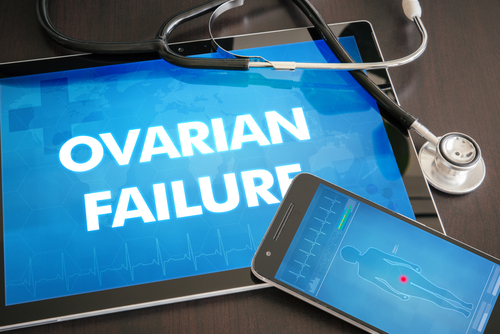10-12% of infertile women in Mumbai face premature ovarian failure: Study
PTI May 19, 2018
A study conducted by The Institute for Social and Economic Change (ISEC) showed nearly 1-2% Indian women experienced signs of menopause between 29 and 34 years of age, 8% face it between 35 and 39 years of age, and 10-12% who face difficulties in conceiving suffer from low ovarian reserve or premature ovarian failure

Dr. Sulbha Arora, Fertility Consultant at Nova IVI Fertility, Mumbai, said, "When the ovaries fail, they don't produce normal amounts of oestrogen hormone or release eggs regularly. Lesser number of eggs in the ovaries reduces women's fertility potential and makes it difficult for them to conceive. Well-known and well-documented risk factors exist, and the presence or suspicion of autoimmune disorder should be regarded as an important one. In Mumbai, we see about 10-12% of women under the age of 36 who come to us with difficulties in conceiving suffer from low ovarian reserve or premature ovarian failure." Causes and symptoms
Lifestyle changes such as smoking, unmonitored contraceptive pill use, previous ovarian surgeries, anticancer therapies and familial POF are some of the known reasons for low ovarian reserve at a rather young age. X chromosome abnormalities, autosomal causes, galactosemia, autoimmune disorders, cancer treatment, Turner's syndrome, enzyme defects, and environmental toxins are some other factors leading to early menopause. In many cases, the cause cannot be found (idiopathic).
Premature ovarian failure (POF), also referred to as premature ovarian insufficiency, is a condition where there is a physiological, age-related decrease in the number of eggs in the ovaries, which could impact the chances of pregnancy at a younger age (less than 40 years). Normally, follicles in the ovaries supply women with eggs until around the age of 40 to 45 - the average perimenopausal age when the supply of eggs is used up. In POF cases, women as young as 30 years old are seen with no eggs in the ovaries.
Premature ovarian failure is to some degree predictable in its occurrence and should be considered when young women encounter a loss of menstrual regularity. At times, a woman may get normal periods for a few months and then skip it for the next few months. They may also have other symptoms of early menopause like hot flashes, night sweats, sleeping problems, anxiety, mood swings, vaginal dryness, energy loss, low sex drive, painful sex, and bladder control problems.
Depending on the cause, POF may develop as early as the teen years or the problem may have been present from birth. It is difficult, though not impossible, for women who have premature ovarian insufficiency to become pregnant. "Unfortunately, there is no treatment for POF and the effects of age on declining ovarian reserve cannot be reversed.
Hormonal changes due to declining oestrogen levels can be treated, however, fertility cannot be restored in most of these cases. If the reserve is low but not yet completely depleted, women can attempt a self-cycle of ICSI with maximum safe dose of gonadotrophins and use of adjuvants like growth hormone, DHEAS albeit with dubious chances of success. Donor egg IVF is the ideal treatment option in such cases, and the only treatment option after established ovarian failure," added Dr. Arora.
Women with POF should be educated about the condition, given counselling and psychological support as they are at high risk of moderate to severe depression, especially those with infertility. Hormone replacement therapy is mandatory for these women because they are at an increased risk of developing osteoporosis, cardiovascular disorders and coronary heart diseases. General measures like increased physical activity, calcium rich diet, vitamin D supplementation, avoidance of cigarette smoking should be discussed. For women who desire parenthood after exhaustion of treatments for biological gametes, oocyte donation or adoption can be suggested.
In a country with a population of 1.2 billion, it is estimated that a whopping 30 million couples suffer from infertility. What is even more worrying is the rising incidence of young women facing infertility. A condition which was predominantly seen among older couples, infertility is now seen more frequently seen in women who are younger than 35 years of age.
-
Exclusive Write-ups & Webinars by KOLs
-
Daily Quiz by specialty
-
Paid Market Research Surveys
-
Case discussions, News & Journals' summaries